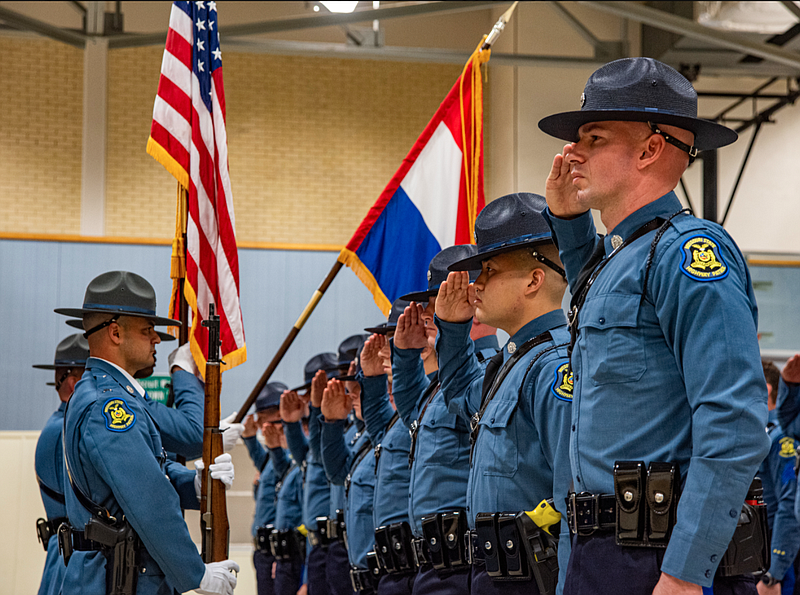Missouri Gov. Mike Parson is seeking to fill shortages in law enforcement agencies across the state with a new scholarship opportunity.
On Friday, Parsons announced the launch of the $1 million Missouri Blue Scholarship fund to help attract more Missourians to law enforcement careers, according to a news release from the governor's office.
The scholarships are available to prospective officers who aren't sponsored by a law enforcement agency and don't already know what agency they'll work for. Because this group of recruits aren't sponsored, they typically pay a $5,000 tuition fee for attending training. The scholarship will offset that cost by paying $5,000 toward the cost of attending a law enforcement academy.
"If you're applying to the academy or if you're in a law enforcement academy right now and you're paying from your own pocket, as of this morning, you are now able to fill out the form to apply for the scholarship," said Mike O'Connell, communications director for the Missouri Department of Public Safety.
Just within the first day of the scholarship's announcement, the department received 43 online applications, O'Connell said.
In the release, Parson said, "Our men and women who choose law enforcement careers are making a commitment to serve and sacrifice in order to make Missouri communities safer, and we witnessed the critical importance of their service during this week's tragic events," referring to a deadly school shooting Oct. 24 at the Central Visual and Performing Arts High School in St. Louis, the 67th shooting this year on U.S. school grounds.
He emphasized the Missouri Blue Scholarship is meant to help attract recruits who may not have the resources to attend a law enforcement academy, noting the announcement comes at a time when many agencies are experiencing officer shortages.
Around 10 years ago, the State Highway Patrol academy averaged close to 1,200 applicants per class, MSHP Capt. John Hotz said. Five years ago, they'd average around 600 applicants per class. Today, they average around 310 applicants per class.
Also 10 years ago, Hotz said, around 70 new troopers would graduate each year. This year, it's around 48.
The number of new peace officer licenses issued in 2021 fell to 987 from a height of 1,149 in 2018, according to records from the Department of Public Safety. But O'Connell emphasized these numbers don't convey the full picture because it doesn't represent the increasing number of resignations.
Law enforcement agencies around the country are having issues with staffing levels. Attitudes toward law enforcement, among other things, have made it difficult to attract qualified applicants," said Hotz, who noted the patrol was 115 troopers short as of Oct. 1.
"When you consider the number of people who will retire this year, it is easy to see that we will have a very difficult time catching up," he said.
Late September, the Columbia Police Department was looking to fill 21 vacancies as it continues to combat a staffing shortage, according to reporting from KMIZ.
That same month, the Jefferson County Sheriff's Office shared a deputy's resignation letter with a dire warning that the number of law enforcement personnel leaving the department is "not sustainable."
This year, the St. Louis County Police Department reported 85 job openings and 65 veteran officers leaving the department. The St. Louis Metropolitan Police Department saw similar issues, reporting 165 job openings and 138 veteran officers leaving this year.
In April, the Kansas City Police Department disbanded the Cold Case and Missing Persons Unit, causing some outrage among some city officials and residents. The department reported it was out of options, since officers were needed to cover the basics.
In Jefferson City, Capitol police have had to seek help from part-time retiree officers more and more, O'Connell said.
"In Missouri and across the country, there is a need for additional law enforcement officers at sheriff's departments, at statewide law enforcement agencies, at local police departments and at major urban police departments," O'Connell said. "There's tremendous competition among different departments in the state of Missouri for those smaller classes of people from the academies."
Being able to help with the cost of attending law enforcement training is a key strategy the department uses for recruiting, he said.

